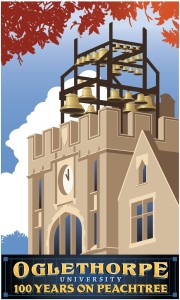It has been said that Oglethorpe University died at Gettysburg. When all the young scholars went off to war, faculty were dispersed, the endowment invested in Confederate bonds, and the buildings used as barracks and hospitals and later burned, Old Oglethorpe in Midway, Georgia, was no more.
Nescit Cedere!
Oglethorpe and its supporters did not give up. The University was relocated after the war to Atlanta in 1870, and quickly became an important institution in the life of the city. But shortly after beginning its third term, The Presbyterian Synod of Georgia ordered the university closed due to financial difficulties. This, too, appeared to be the end of the road for Oglethorpe.
Nescit Cedere!
But again, Oglethorpe was not dead. Allen Tankersley, in his 1951 book College Life at Old Oglethorpe, described the closing this way: Like Rip Van Winkle, Oglethorpe was now to sleep for forty years. The University was in a state of coma if not dead, but in 1913 Thornwell Jacobs, a grandson of one of the old professors at Midway, re-chartered Oglethorpe in Atlanta, and opened the campus’ first building two years later.
Manu Dei Resurrexit!
In 2015, we celebrate 100 years on this campus, since the groundbreaking for the first building, Phoebe Hearst Hall. If walls could talk, imagine the stories that would flow from our blue granite walls. Imagine the lives changed beneath the variegated slate roofs, the traditions born within the quartered oak walls, and the graduates ushered into the world by our 42-bell carillon, ready to make a life, make a living, and make a difference. These stories, and there are thousands upon thousands of them, were made possible due to the perseverance of one man who never gave up on his dream to build one of the world’s great institutions. Dr. Thornwell Jacobs penned an essay to share his story of inspiration, that led to the refounding of Oglethorpe. Through his story, and the countless others who have followed, we come to understand the true meaning of our motto, Nescit Cedere:
“He or she does not know how to give up.”

